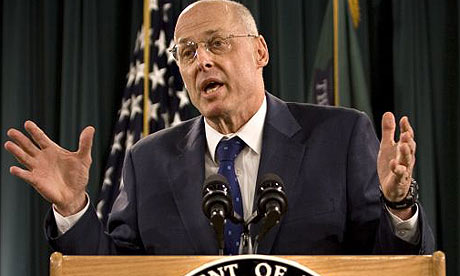How close are Goldman Sachs's connections with the US treasury?
What can we make of 'two dozen' conversations between treasury secretary Henry Paulson and Goldman's Lloyd Blankfein last September during the AIG rescue?
Just how useful are Goldman Sachs's connections in high places? To date, I've been a bit sceptical about conspiracy theorists who say the bank's glittering list of alumni in government give it a kind of golden protection. But an astonishing factoid emerged this weekend about Goldman's relationship with President Bush's treasury secretary, Henry Paulson.

Henry Paulson, US treasury secretary and former Goldman Sachs chief executive, talking to the media during the financial crisis last September. Photograph: J Scott Applewhite/AP
Just how useful are Goldman Sachs's connections in high places? To date, I've been a bit sceptical about conspiracy theorists who say the bank's glittering list of alumni in government give it a kind of golden protection. But an astonishing factoid emerged this weekend about Goldman's relationship with President Bush's treasury secretary, Henry Paulson.
Paulson's office calendar at the treasury, obtained by the New York Times through a Freedom of Information request, reveals that he spoke to Goldman's boss, Lloyd Blankfein, two dozen times during the September week in which the treasury bailed out the troubled insurer AIG. That's "far more frequently" than Paulson talked to any other Wall Street executive.
Two dozen times? That's more than three times a day. More often than I speak to the Guardian's business editor. It's more often than many courting couples communicate. It's almost stalker-like behaviour. On 17 September alone, Paulson and Blankfein apparently spoke five times.
Paulson, as we know, was Goldman Sachs's chief executive for eight years before moving into government and Goldman, as has been widely documented, was the biggest counterparty to the ill-considered financial insurance policies which drove AIG to the brink of collapse. When AIG suffered a downgrade in its credit rating, Goldman began making collateral calls on its insurance contracts which eventually totalled some $13bn (£7.8bn).
Goldman had more at stake than anybody else in seeing that AIG survived. Critics contend, although Goldman hotly rejects this, that Goldman could have crumbled if the insurer had failed to cough up its dues. There is no doubt that the treasury's decision to rescue AIG worked hugely in Goldman's favour.
Paulson's decisions last year were uneven. He helped put together a rescue takeover of Bear Stearns, then allowed Lehman Brothers to go bust. Days later, he decided that AIG needed to be propped up. There's no doubt that one of the reasons was that he feared that bankruptcy of AIG would destabilise more financial institutions. The biggest one of them was Goldman.
There was no personal financial interest for Paulson in helping Goldman. Quite rightly, he was obliged to sell his $480m (£289m) worth of Goldman stock when he joined the Bush administration in 2006. But a long period inside an organisation can give a warped perspective of its importance in the grand scheme of things. Paulson probably believed that Goldman was critical to the survival of the financial system. Others might disagree.
The number of conversations between Blankfein and Paulson raises a legitimate question over whether Goldman was afforded better access to the treasury secretary than its rivals were. Could Paulson's personal relationship with former colleagues at the bank have affected his judgment?
Goldman executives insist that, in fact, the presence of its former executives in powerful positions works against the bank. They maintain that Paulson and others were paranoid about looking as if they might be helping the bank – to the extent that the treasury rejected offers from Goldman to buy both Bear Stearns and another struggler, Washington Mutual, for fear of accusations of favouritism.

No comments:
Post a Comment